英语中的省略句
英语语法——省略句

Because of being ill, he didn't go to school.
Before he was admitted, he entered.
Before being admitted, he entered.
After he was caught by the police, the thief admitted.
14
so可以代替单词、词组或句子,作call, expect, think,
believe, suppose, guess, hope, do, fear, imagine, hear, say, tell, be afraid, notice等宾语,not用以代替否定的 句子,用法与so相似,并可放在perhaps、probably、 absolutely等副词后面。
21
状语从句中的省略
将状语从句的主语连同be动词一起省略。但是由after、 before、because等引导的状语从句一般要改成介词短语的形 式,用动名词being代替省去的be(因为after、before本身 就可作为介词,而because的介词短语为because of)。
22
Because he was ill, he didn't go to school.
谓语,即doing或having done两种形式(因为状语从句的主语在 谓语中没有be动词的情况下,只可能是主动关系,不可能是被动 关系),而且引导状语从句的连词一般都可省。
have difficulty/trouble/hard time/business (in) doing sth. 18
当 连 接 代词what/whose、 连 接 副词how/when以及 whether引导的从句或不定式短语时,其前面的of、 about、as to等常可省略。
英语中几种常用省略的用法总结

英语中几种常用省略的用法总结省略在英语语言的应用非常广泛,其中有很多常用的省略用法。
下面总结一下以往常见的一些省略形式:一、表示未表达完整的缩写1、单字缩写。
如: is,>’s; has,>’s; have,>’ve;I,>I’m; he,>he’s; she,>she’s; do,>do’s;does,>does’s; am,>am’s2、多字缩写。
如:are not,>aren’t; cannot,>can’t; do not,>don’t; will not,>won’t; have not,>haven’t; would not,>wouldn’t; could not,>couldn’t; shouldnot,>shouldn’t; it is,>it’s; that is,>that’s; there is,>there’s二、表示不完整词组的省略1、定语从句中的省略。
如:(1) All the students (who are) present here are eager to study.(2) This is the reason (why) he decided to quit his job.2、表示概念的省略。
如:(1) TV and radio (programmes).(2) To do more exercise (is beneficial to your health).三、表示句子成分的省略1、宾语的省略。
如:(1) I like to read (books).(2) He gave me an answer (to my question).2、表语的省略。
如:(1) He is a teacher (of English).(2) The weather today is (very) hot.3、主语的省略。
英语省略句
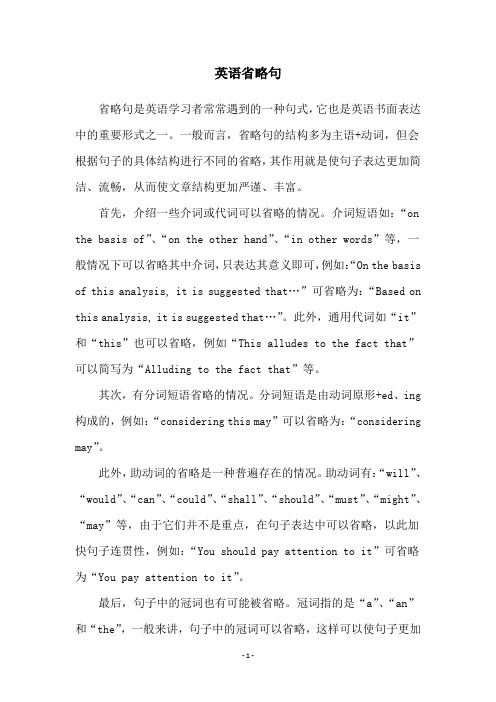
英语省略句省略句是英语学习者常常遇到的一种句式,它也是英语书面表达中的重要形式之一。
一般而言,省略句的结构多为主语+动词,但会根据句子的具体结构进行不同的省略,其作用就是使句子表达更加简洁、流畅,从而使文章结构更加严谨、丰富。
首先,介绍一些介词或代词可以省略的情况。
介词短语如:“on the basis of”、“on the other hand”、“in other words”等,一般情况下可以省略其中介词,只表达其意义即可,例如:“On the basis of this analysis, it is suggested that…”可省略为:“Based on this analysis, it is suggested that…”。
此外,通用代词如“it”和“this”也可以省略,例如“This alludes to the fact that”可以简写为“Alluding to the fact that”等。
其次,有分词短语省略的情况。
分词短语是由动词原形+ed、ing 构成的,例如:“considering this may”可以省略为:“considering may”。
此外,助动词的省略是一种普遍存在的情况。
助动词有:“will”、“would”、“can”、“could”、“shall”、“should”、“must”、“might”、“may”等,由于它们并不是重点,在句子表达中可以省略,以此加快句子连贯性,例如:“You should pay attention to it”可省略为“You pay attention to it”。
最后,句子中的冠词也有可能被省略。
冠词指的是“a”、“an”和“the”,一般来讲,句子中的冠词可以省略,这样可以使句子更加简洁。
例如:“He took the car and drove away”可省略为“He took car and drove away”。
英语省略句总结
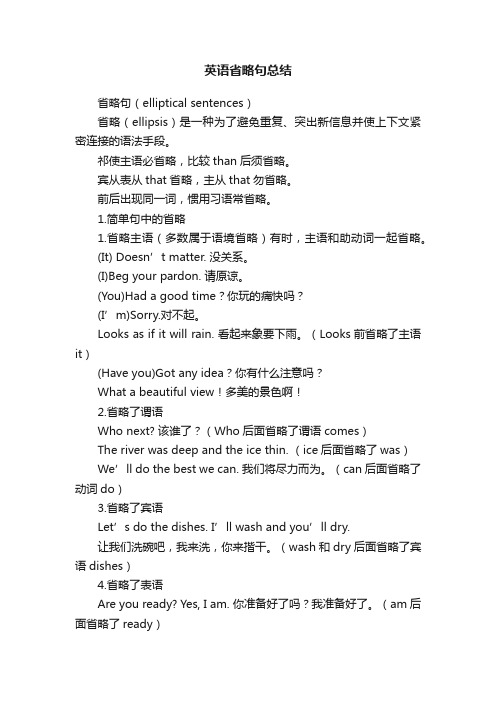
英语省略句总结省略句(elliptical sentences)省略(ellipsis)是一种为了避免重复、突出新信息并使上下文紧密连接的语法手段。
祁使主语必省略,比较than后须省略。
宾从表从that省略,主从that勿省略。
前后出现同一词,惯用习语常省略。
1.简单句中的省略1.省略主语(多数属于语境省略)有时,主语和助动词一起省略。
(It) Doesn’t matter. 没关系。
(I)Beg your pardon. 请原谅。
(You)Had a good time?你玩的痛快吗?(I’m)Sorry.对不起。
Looks as if it will rain. 看起来象要下雨。
(Looks前省略了主语it)(Have you)Got any idea?你有什么注意吗?What a beautiful view!多美的景色啊!2.省略了谓语Who next? 该谁了?(Who后面省略了谓语comes)The river was deep and the ice thin. (ice后面省略了was)We’ll do the best we can. 我们将尽力而为。
(can后面省略了动词do)3.省略了宾语Let’s do the dishes. I’ll wash and you’ll dry.让我们洗碗吧,我来洗,你来揩干。
(wash和dry后面省略了宾语dishes)4.省略了表语Are you ready? Yes, I am. 你准备好了吗?我准备好了。
(am后面省略了ready)He was a lover of sports as he had been in his youth.他还是象年轻时那样,是一位运动爱好者。
(had been后面省略了a lover of sports)5.省略了状语He was not hurt. Strange! 他没有受伤,真奇怪!(Strange前面省略了状语how)6.同时省掉句子几个成份。
中考英语省略句的归纳总结
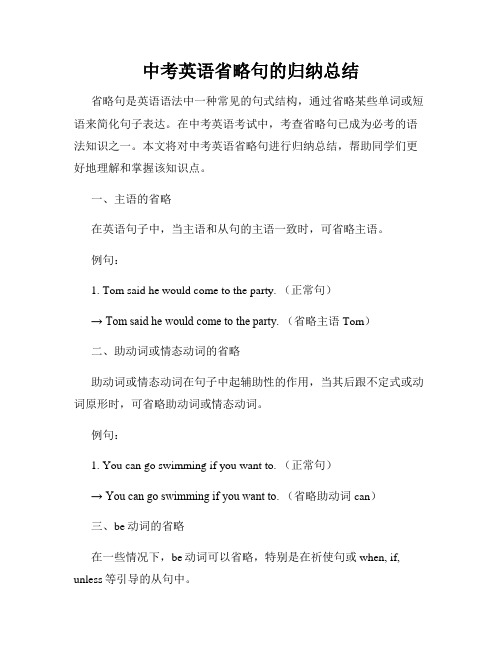
中考英语省略句的归纳总结省略句是英语语法中一种常见的句式结构,通过省略某些单词或短语来简化句子表达。
在中考英语考试中,考查省略句已成为必考的语法知识之一。
本文将对中考英语省略句进行归纳总结,帮助同学们更好地理解和掌握该知识点。
一、主语的省略在英语句子中,当主语和从句的主语一致时,可省略主语。
例句:1. Tom said he would come to the party. (正常句)→ Tom said he would come to the party. (省略主语Tom)二、助动词或情态动词的省略助动词或情态动词在句子中起辅助性的作用,当其后跟不定式或动词原形时,可省略助动词或情态动词。
例句:1. You can go swimming if you want to. (正常句)→ You can go swimming if you want to. (省略助动词can)三、be动词的省略在一些情况下,be动词可以省略,特别是在祈使句或when, if, unless等引导的从句中。
例句:1. Be quiet and listen to the teacher. (正常句)→ Be quiet and listen to the teacher. (省略be动词)四、状语的省略当主句和从句之间的时间状语、地点状语、方式状语等相同或相似时,可将其在从句中省略。
例句:1. He lives in Beijing and I live in Beijing. (正常句)→ He lives in Beijing and I do too. (省略相同的地点状语in Beijing)五、连接词的省略在句子中,连接词如and, but, or等可以省略,特别是在并列句中。
例句:1. She is tall and she is thin. (正常句)→ She is tall and thin. (省略连接词and)六、祈使句中的省略在祈使句(祈使句用于表达命令、请求、劝告等)中,主语you可以省略。
高中英语语法-省略句
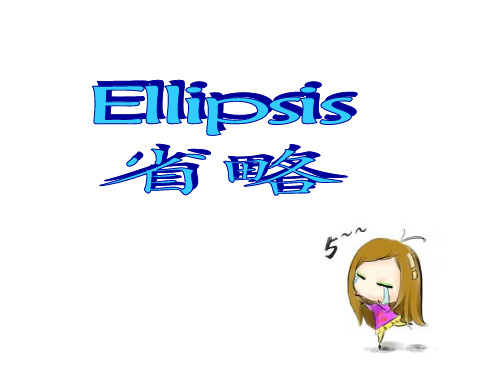
: Unlesshhee is invited, he won’t come.
: Unlesshe is invited, he won’t come. : Whilehhee is doing house work, my father often listens to music. : While he is doing house work, my father often listens to music.
2、省略主谓或主谓语的一部分。如:
(省略主语和谓语)
: What/How (do you think) about a cup of tea ? : Why (do you) not say hello to him ?
3、省略表语。
: –Are you thirsty? – Yes, I am(.thirsty). : His brother isn’t lazy, nor is his sister(.lazy).
※介词的省略※(考点)
1. 一些常和动名词、形容词一起搭配的介词常省 略,而保留其后的 动名词,常见的句型有
spend/waste time (in) doing, lose no time (in) doing; have difficult/trouble (in) doing; be busy (in) doing; stop/prevent sb. (from) doing 等。
: The order that we(sshhoouuldld) stay where we are is very serious and severe.
: It’s very important that students(shshoouuldld) study hard at school.
英语中的省略句
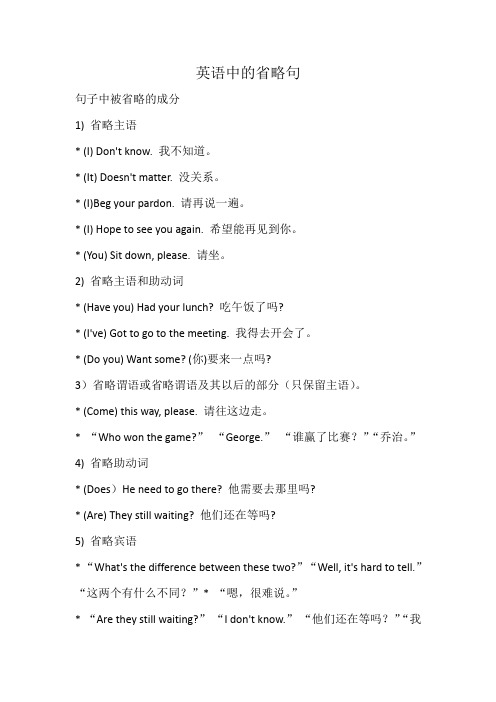
英语中的省略句句子中被省略的成分1) 省略主语* (I) Don't know. 我不知道。
* (It) Doesn't matter. 没关系。
* (I)Beg your pardon. 请再说一遍。
* (I) Hope to see you again. 希望能再见到你。
* (You) Sit down, please. 请坐。
2) 省略主语和助动词* (Have you) Had your lunch? 吃午饭了吗?* (I've) Got to go to the meeting. 我得去开会了。
* (Do you) Want some? (你)要来一点吗?3)省略谓语或省略谓语及其以后的部分(只保留主语)。
* (Come) this way, please. 请往这边走。
* “Who won the game?”“George.”“谁赢了比赛?”“乔治。
”4) 省略助动词* (Does)He need to go there? 他需要去那里吗?* (Are) They still waiting? 他们还在等吗?5) 省略宾语* “What's the difference between these two?”“Well, it's hard to tell.”“这两个有什么不同?”* “嗯,很难说。
”* “Are they still waiting?”“I don't know.”“他们还在等吗?”“我不知道。
”6)省略主语和谓语* No, there won't. 不,不会有。
* Yes, there will. 是的,将会有。
(完整版)英语省略句的六大总结

英语中的六大省略现象概念:为了避免重复,省略句中的一个或几个句子成分,这种语法现象称为省略。
1. 简单句中的省略现象例:(1)在对话中,例如:—How is your mother today? 你妈妈今天怎样?—(She is) Much better. (她)好多了。
(2)在祈使句中,例如:(You) Open the door, please! 请开门!(3)在感叹句中,例如:What a (good) boy (he is)! 多好的男孩啊!How (hard) they are working! 他们工作得多努力呀!(4)表示讲话人的意见和看法,上下文意思很清楚,例如:(It) sounds fine to me.(It's a) pity you couldn't come. 你不能来,真遗憾。
(5)提问,例如:(Is there) anything wrong? 发生了什么事吗?(Have you) found the treasure? 你已经找到珠宝了吗?(6)名词所有格修饰的名词若表示店铺、住宅、教堂或上下文已暗示或明确指出过的事物。
例如:at her mother's (house) 在她妈妈家里at the doctor's (house) 在医院里at the barber's (shop) 在理发店里at the tailor's (shop) 在裁缝店里(7)动词不定式的省略。
前面出现过的动词在下文再次出现时,可以单纯使用不定式符号to。
动词不定式的省略,一般只省略动词,而保留符号“to”。
例如:—Will you go with me? 你愿意跟我一块去吗?—Well, I'd like to(go with you). 我非常愿意。
I'd like to.也可用I'd love to. /I'd be happy to. 来取代。
英语句子中的省略
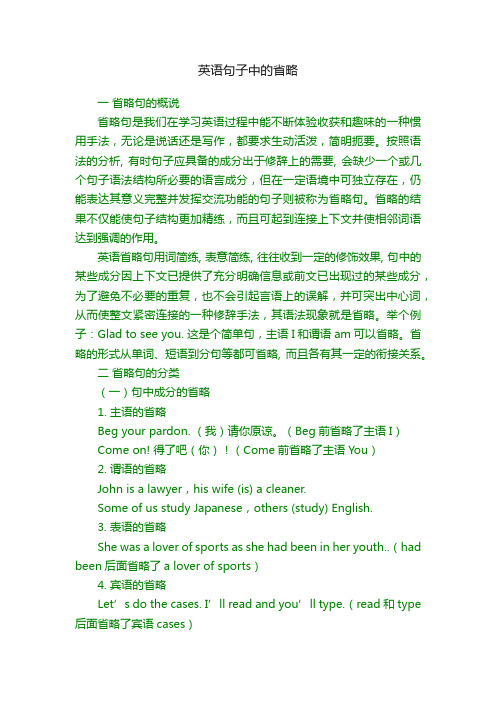
英语句子中的省略一省略句的概说省略句是我们在学习英语过程中能不断体验收获和趣味的一种惯用手法,无论是说话还是写作,都要求生动活泼,简明扼要。
按照语法的分析, 有时句子应具备的成分出于修辞上的需要, 会缺少一个或几个句子语法结构所必要的语言成分,但在一定语境中可独立存在,仍能表达其意义完整并发挥交流功能的句子则被称为省略句。
省略的结果不仅能使句子结构更加精练,而且可起到连接上下文并使相邻词语达到强调的作用。
英语省略句用词简练, 表意简练, 往往收到一定的修饰效果, 句中的某些成分因上下文已提供了充分明确信息或前文已出现过的某些成分,为了避免不必要的重复,也不会引起言语上的误解,并可突出中心词,从而使整文紧密连接的一种修辞手法,其语法现象就是省略。
举个例子:Glad to see you. 这是个简单句,主语I和谓语am可以省略。
省略的形式从单词、短语到分句等都可省略, 而且各有其一定的衔接关系。
二省略句的分类(一)句中成分的省略1. 主语的省略Beg your pardon. (我)请你原谅。
(Beg前省略了主语I)Come on! 得了吧(你)!(Come前省略了主语You)2. 谓语的省略John is a lawyer,his wife (is) a cleaner.Some of us study Japanese,others (study) English.3. 表语的省略She was a lover of sports as she had been in her youth..(had been后面省略了a lover of sports)4. 宾语的省略Let’s do the cases. I’ll read and you’ll type.(read和 type 后面省略了宾语cases)5. 定语的省略I spent part of the money, and the rest I gave.(the rest后面省略了定语of the money)6. 状语的省略She wasn’t cry. Strange! (Strange前面省略了状语how)7. 词的省略1)名词、冠词、物主代词或介词如果与前文重复时,可以省略,如:I like red wine better than white (wine).The lightning flashed and (the) thunder crashed.Please take good care of these flowers and (these) plants.We lived in Beijing and (in) Shanghai for some time.2)重复出现的形容词,省略后边的;两个或两个以上被形容词修饰的同一名词,前边的则常被省略。
完整版英语省略句的六大总结

完整版英语省略句的六大总结
1.主语省略:当主语已经被上下文所明确时,可以省略主语。
例句:(原句)I am going to the bookstore.
(省略) Going to the bookstore.
2.谓语动词省略:当谓语动词已经被上下文所明确时,可以省略谓语动词。
例句:(原句)She can play tennis very well.
(省略) She can play very well.
3.宾语省略:当上下文中已明确了宾语时,可以省略宾语。
例句:(原句) Would you like to have some watermelon?
(省略) Would you like some?
4.介词省略:当介词与其宾语紧密相连,且已明确时,可以省略介词。
例句:(原句) We are waiting for you in the park.
(省略) We are waiting for you the park.
5.主语从句省略:当主语从句中的主语与句子的主语相同,可
以省略主语从句。
例句:(原句) That he could swim surprised me.
(省略) To swim surprised me.
6.定语从句省略:当定语从句中的关系代词为主语时,可以省略关系代词。
例句:(原句) The book that I borrowed from the library is very interesting.
(省略) The book I borrowed from the library is very interesting.。
高中英语语法省略句课件(共41张PPT)
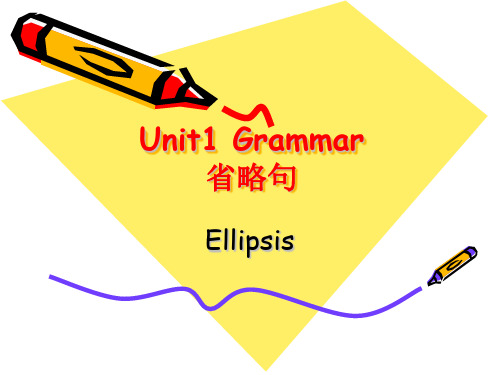
• 11.The teacher told us to remain silent
unless _____C___.
• A.to be asked B.being asked
C.asked
D.you asked
answers:
singer: it was a real opportunity for me to be cast. it had always been one of my strongest desires to have a part in turandot.
特殊文体中的省略
Signs
no smo is allowed here.
This is a one-way street.
Instructions
Put this side up, please.
Please handle this with care.
Headlines
Houses destroyed in weekend storms.
• 巩固一下:
• 1.The experiment shows that proper amounts of exercise ,if ________regularly, can improve our health.(2010浙江卷)
• A. being carried out B. carrying
A. not to
B. not to do
C. not do it
D. do not to
3. ---What’s the matter with Della?
--- Well, her parents wouldn’t allow her to go
英语特殊句式——省略句
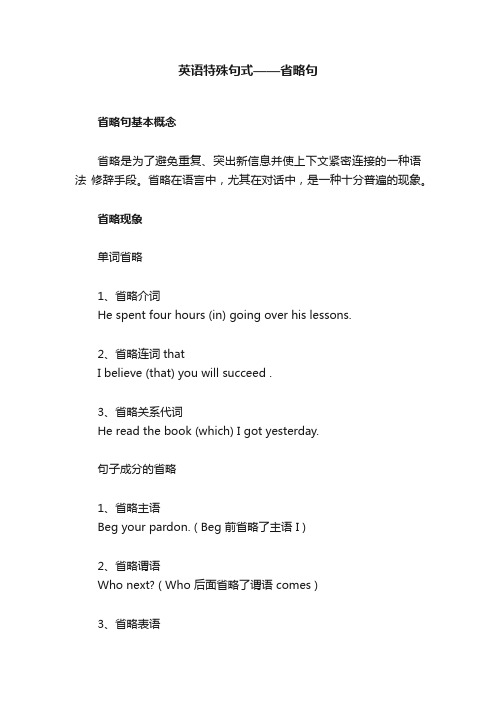
英语特殊句式——省略句省略句基本概念省略是为了避免重复、突出新信息并使上下文紧密连接的一种语法修辞手段。
省略在语言中,尤其在对话中,是一种十分普遍的现象。
省略现象单词省略1、省略介词He spent four hours (in) going over his lessons.2、省略连词thatI believe (that) you will succeed .3、省略关系代词He read the book (which) I got yesterday.句子成分的省略1、省略主语Beg your pardon. ( Beg 前省略了主语 I )2、省略谓语Who next? ( Who 后面省略了谓语 comes )3、省略表语Are you ready? Yes, I am. ( am 后面省略了 ready )4、省略宾语Let ' s do the dishes. I ' ll wash and you ' ll dry. ( wash 和 dry 后面省略了宾语 dishes )5、省略定语He spent part of the money, and the rest he saved. ( the rest 后面省略了定语 of the money )6、省略状语He was not hurt. Strange! ( Strange 前面省略了状语 how )不同句式中的省略1.简单句中的省略:在对话中,交谈双方都知道谈论的对象,则可以省略句子的主语,省略主语和谓语的现象在交际用语中出现的很多。
Sounds like a good idea.2.并列句中的省略:在并列句中,相同的成分如主语,谓语,宾语等都可以省略。
They learn French and we English.3.复合句中的省略:定语从句:That’s the reason he is late for the conference.状语从句:(1)时间状语从句中,省略“主语+be”:When (she was) very young,she began to learn to play the violin.(2)条件状语从句中,省略“主语+be”:If (he is) given more time, he will do the work better.(3)让步状语从句中,省略“主语+be”:Though (he is) a young man, he has made several inventions. (4)方式状语从句中,省略“主语+be”:She talked to the stranger as if (she were) absent-minded.(5)比较状语从句省略相关成分:由than或as引导的比较状语从句,在意义明确的情况下,可以省略than或as后面的相应部分,这一点与上述情况不同。
省略句的常见形式与解析
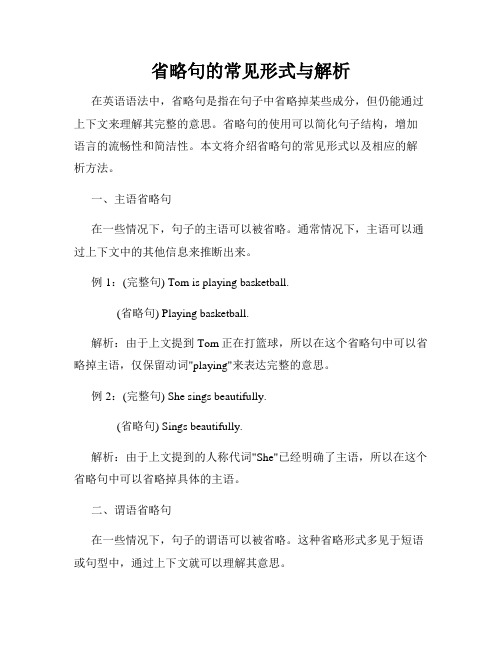
省略句的常见形式与解析在英语语法中,省略句是指在句子中省略掉某些成分,但仍能通过上下文来理解其完整的意思。
省略句的使用可以简化句子结构,增加语言的流畅性和简洁性。
本文将介绍省略句的常见形式以及相应的解析方法。
一、主语省略句在一些情况下,句子的主语可以被省略。
通常情况下,主语可以通过上下文中的其他信息来推断出来。
例1:(完整句) Tom is playing basketball.(省略句) Playing basketball.解析:由于上文提到Tom正在打篮球,所以在这个省略句中可以省略掉主语,仅保留动词"playing"来表达完整的意思。
例2:(完整句) She sings beautifully.(省略句) Sings beautifully.解析:由于上文提到的人称代词"She"已经明确了主语,所以在这个省略句中可以省略掉具体的主语。
二、谓语省略句在一些情况下,句子的谓语可以被省略。
这种省略形式多见于短语或句型中,通过上下文就可以理解其意思。
例1:(完整句) He can play the guitar, but I can't.(省略句) He can play the guitar, but I can't play (the guitar).解析:在这个省略句中,通过上文提到的主题"play the guitar",可以省略掉谓语"Not",而保留上文中的句意。
例2:(完整句) John lives in New York, and Mary in Los Angeles.(省略句) John lives in New York, and Mary in Los Angeles.解析:在这个省略句中,由于谓语"lives"已经在上文中出现过,因此可以省略掉后面的谓语,仅根据上下文理解出Mary的具体情况。
初中英语 省略句用法
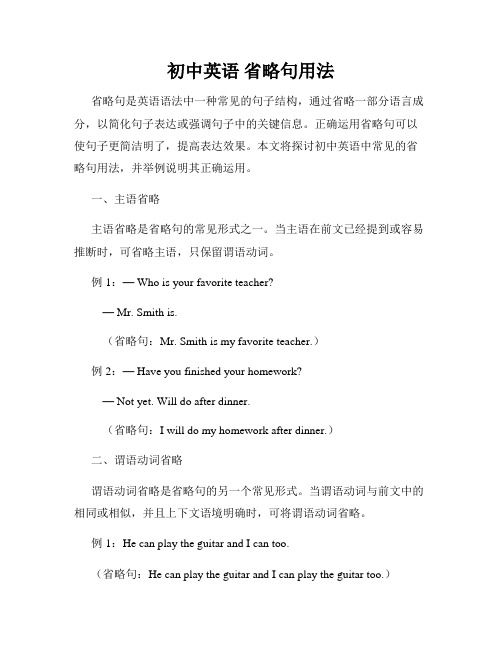
初中英语省略句用法省略句是英语语法中一种常见的句子结构,通过省略一部分语言成分,以简化句子表达或强调句子中的关键信息。
正确运用省略句可以使句子更简洁明了,提高表达效果。
本文将探讨初中英语中常见的省略句用法,并举例说明其正确运用。
一、主语省略主语省略是省略句的常见形式之一。
当主语在前文已经提到或容易推断时,可省略主语,只保留谓语动词。
例1:— Who is your favorite teacher?— Mr. Smith is.(省略句:Mr. Smith is my favorite teacher.)例2:— Have you finished your homework?— Not yet. Will do after dinner.(省略句:I will do my homework after dinner.)二、谓语动词省略谓语动词省略是省略句的另一个常见形式。
当谓语动词与前文中的相同或相似,并且上下文语境明确时,可将谓语动词省略。
例1:He can play the guitar and I can too.(省略句:He can play the guitar and I can play the guitar too.)例2:She likes singing and dancing, and her brother likes singing too.(省略句:She likes singing and dancing, and her brother likes singing too.)三、宾语省略宾语省略是省略句的又一常见形式。
当宾语在前文已经提到或容易推断时,可将宾语省略。
例1:— Did you get the message I left you?— Yes, received it.(省略句:Yes, I received the message.)例2:— Are you going to the concert with us?— Sorry, can't. Have another plan.(省略句:Sorry, I can't go to the concert with you. I have another plan.)四、介词短语省略在介词短语中,当后一个成分与前一个短语中的某个成分相同或相关时,可将重复的成分省略。
高中英语知识点归纳省略句的特殊情况与应用
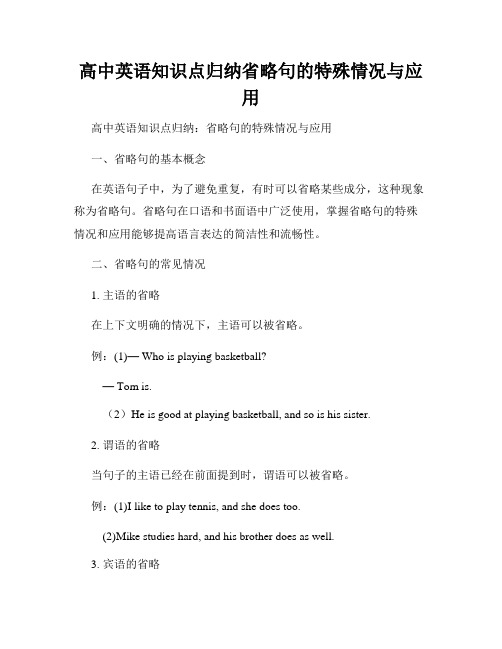
高中英语知识点归纳省略句的特殊情况与应用高中英语知识点归纳:省略句的特殊情况与应用一、省略句的基本概念在英语句子中,为了避免重复,有时可以省略某些成分,这种现象称为省略句。
省略句在口语和书面语中广泛使用,掌握省略句的特殊情况和应用能够提高语言表达的简洁性和流畅性。
二、省略句的常见情况1. 主语的省略在上下文明确的情况下,主语可以被省略。
例:(1)— Who is playing basketball?— Tom is.(2)He is good at playing basketball, and so is his sister.2. 谓语的省略当句子的主语已经在前面提到时,谓语可以被省略。
例:(1)I like to play tennis, and she does too.(2)Mike studies hard, and his brother does as well.3. 宾语的省略当句子的宾语已经在前面提到时,宾语可以被省略。
例:(1)— Have you finished your homework?— Yes, I have.(2)Tom is reading a book, and Mary is too.4. 定语的省略在某些情况下,定语可以被省略,特别是针对被修饰成分为人或物时。
例:(1)I bought some apples and ate them.(2)The flowers in the garden are beautiful, and those in the house are also lovely.5. 状语的省略在上下文中,有些状语可以被省略。
例:(1)I go to school by bus, and so does my brother.(2)She works hard, and sometimes I do too.6. 句子成分的省略在对话或长篇文章中,为了避免重复,可以省略前面出现过的句子成分。
省略句的常见形式与虚拟语气与宾语从句的关系

省略句的常见形式与虚拟语气与宾语从句的关系在英语语法中,省略句是一种常见的句子构造形式,它可以简化表达,减少重复,并增加语言的流畅性。
虚拟语气和宾语从句则是两个与省略句密切相关的语法现象,在句子中起着重要的作用。
本文将重点探讨省略句的常见形式、虚拟语气以及宾语从句与省略句之间的关系。
一、省略句的常见形式1. 主语省略主语省略指的是在句子中省略了主语,常出现在陈述句中,日常生活中的对话中尤为常见。
例如:- Are you coming? (你来吗?)- Hope so. (希望如此。
)2. 动词省略动词省略是指省略句中的谓语动词,常出现在情态动词、感官动词、系动词等后面。
例如:- Can you swim?- I can. (我会。
)3. 动词短语省略动词短语省略是指省略句中的动词短语,常出现在对话中,用于回答之前提到的动作或情况。
例如:- Did you buy the book?- Bought it yesterday. (昨天买了。
)二、虚拟语气与省略句虚拟语气是英语中一种重要的语法现象,用于表示与事实相反的假设、愿望、建议、命令等情况。
虚拟语气与省略句之间常有紧密的联系,特别是在条件从句和宾语从句中。
1. 条件从句在条件从句中,省略句常常用来简化重复的表达,而虚拟语气则用于表示与事实相反的假设。
例如:- If I were you, I would go. (如果我是你,我会去。
)- If I had time, I would help. (如果我有时间,我会帮忙。
)2. 宾语从句宾语从句是一个句子作为宾语出现在主句中,而省略句的使用可以让句子更简洁明了。
虚拟语气在宾语从句中的使用也是常见的。
例如:- I suggest (that) he come early. (我建议他早点来。
)- She insisted that he be present at the meeting. (她坚持他参加会议。
英语省略句的几种形式

英语省略句的几种形式
英语省略句的几种形式
(一)省略主语。
如,
She went to the hospital and (she) saw a doctor.
她去医院看了医生。
(二)省略整个谓语或谓语的主要部分。
如,
Either T om must be responsible for the matter or we will be (responsible for the matter).
汤姆必须对此事负责,否则我们将(对此事负责)。
(三)省略谓语中的助动词。
如,
Was Jack playing the guitar and (was) Alice preparing the supper?
杰克在弹吉他,爱丽丝在准备晚饭吗?
(四)省略谓语中主要动词。
如,
Albert needn't stay, but George must (stay).
艾伯特不必留下来,但乔治必须留下来。
(五)省略宾语。
如,
John likes smoking, but Mary hates (smoking).
约翰喜欢抽烟,但玛丽讨厌抽烟。
英语中的省略句和省略句的规则

英语中的省略句是一种特殊的句型,通过省略部分句子成分,使句子更加简洁、流畅。
省略句的使用可以提高句子表达的效果,但也需要注意一些规则。
在英语中,常见的省略句有主语、谓语、宾语和其他成分的省略。
以下是一些常见的省略句规则:1.主语的省略当主语已经在上下文中明确指出时,可以省略主语。
例如:•Who is the winner? (Who: 主语)•Tom is. (Tom: 主语)2.谓语的省略当句子中的谓语动词与上文中的主谓一致时,可以省略谓语动词。
例如:•Have you finished your homework? (Have you: 谓语动词)•Yes, I have. (I have: 谓语动词)3.宾语的省略当宾语是不定式短语、动名词短语或从句时,有时可以省略宾语。
例如:•I want to eat some ice cream. (to eat some ice cream: 宾语)•I want to. (to: 宾语)•She enjoys swimming in the summer. (swimming in the summer: 宾语)•She enjoys it. (it: 宾语)4.其他成分的省略有些介词短语或副词短语在语境中已经明确,可以省略。
例如:•Peter is going to the supermarket. (to the supermarket: 介词短语)•So is Mary. (So: 其他成分)•He said he would visit us tomorrow. (tomorrow: 副词短语)•He said he would. (He: 其他成分)正如以上所述,省略句是一种简化语句结构的技巧,使句子更加简洁。
然而,省略句也有一些注意事项。
首先,省略句要根据上下文进行判断。
如果没有足够的上下文信息,可能会造成误解。
其次,省略句需要遵守语法规则。
(完整word版)高中英语语法—省略句
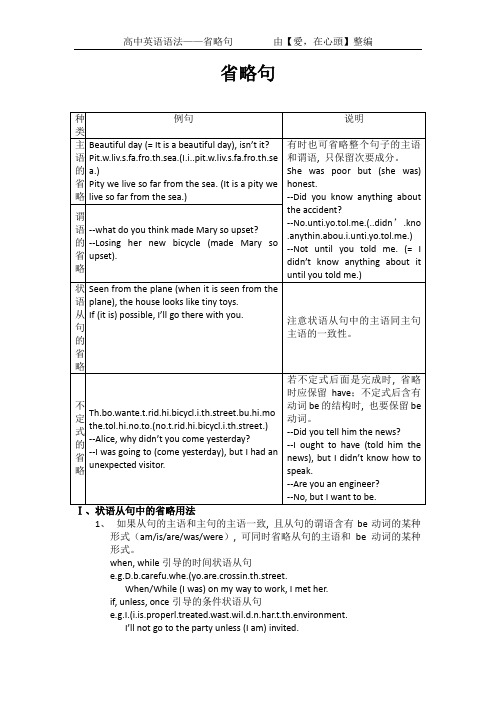
省略句1、如果从句的主语和主句的主语一致, 且从句的谓语含有be动词的某种形式(am/is/are/was/were), 可同时省略从句的主语和be动词的某种形式。
when, while引导的时间状语从句e.g.D.b.carefu.whe.(yo.are.crossin.th.street.When/While (I was) on my way to work, I met her.if, unless, once引导的条件状语从句e.g.I.(i.is.properl.treated.wast.wil.d.n.har.t.th.environment.I’ll not go to the party unless (I am) invited.Once (you are) caught stealing in a supermarket, you will be punished.though, although, whether, no matter whether/what/how/who等引导的让步状语从句e.g.H.wa.happy.though/althoug.(h.was.poor.Whether (she is) sick or well, she is always cheerful.2、No matter how/However hard the task (is), we must fulfill it in time.(注: 从句的主语和主句的主语不一致时, 只省略从句中的be动词形式)as if, as though引导的方式状语从句e.g.H.rubbe.hi.eye.an.yawne.a.if/thoug.(h.was.wakin.u.afte..lon.sleep.He stood up as if/though (he wanted) to leave.(as if/though + to do表示一个将来的动作)than, as引导的比较状语从句中的省略用法: 当不同的主语进行比较时, 一般省略从句中的谓语;当从句中的主语与谓语(be动词除外)和主句中的主语与谓语相同时, 通常省略从句中的主语和谓语, 只保留比较部分。
- 1、下载文档前请自行甄别文档内容的完整性,平台不提供额外的编辑、内容补充、找答案等附加服务。
- 2、"仅部分预览"的文档,不可在线预览部分如存在完整性等问题,可反馈申请退款(可完整预览的文档不适用该条件!)。
- 3、如文档侵犯您的权益,请联系客服反馈,我们会尽快为您处理(人工客服工作时间:9:00-18:30)。
英语中的省略句作者:王云杰来源:《科教导刊·电子版》2013年第27期摘要在英语中,常见省略句被作为一个单独的语法项目来教。
但它也时常阻碍学生的正确答题,干扰学生对长难句子的理解,本文就此项语法进行简要分析。
关键词英语教学省略句中图分类号:H315 文献标识码:A1省略句必须符合以下几条标准(1)被省略的部分必须是明确的,容易恢复的。
一个省略结构如果不能很容易地把被省略的部分填进去,那就成为意义含糊的结构。
省略句必须在语法上是有明显短缺的,这种结构上的短缺使读者一看即知在结构上少了什么,因而能够把它作为一个省略现象来理解。
(2)被省略部分填补后是合乎语法的句子。
一个省略结构,如果把被省略的部分填补进去,就一定会不改变原意而仍然是一个合乎语法的句子。
(3)被省略的词语通常以相同的语法形式出现在上下文中。
2常见的各种形式省略句2.1省略主语Than you.(Thank 前面省去了I)谢谢你。
Take care!(Take 前面省去了You)当心!Serves him right!(Serves前面省去了It)他活该!2.2省略谓语或部分谓语动词Cocks and hens must be fed and pigs fattened.(Pigs 后面省去了must be)鸡需要喂,猪需要育肥。
I sat near the window, he----near the door.(he 后面省去了sat)我靠近窗户坐,他靠近门坐。
Nothing except that I don’t want to leave the place where I’ve worked for many years. (Nothing 前面省去了There is)没有别的原因,只是我不愿意离开我工作了多年的地方。
2.3省略表语Are you ready? Yes , I am.(am后面省去了 ready)你准备好了吗?是的,我准备好了。
He was a lover of sports as he had been in his youth. (had been 后面省去了a lover of sports)他还是像年轻时那样,是一位运动爱好者。
Is he better today?-----Not at all(=He is not better at all).他今天好些了吗?一点也没好。
2.4省略宾语Do n’t you know her address? -----No, I forget. (forget后面省去了her address)你不知道她的地址吗?-----不,我忘了。
Will you do it ?------I will try.(try后面省去了to do it)你愿意做这件事吗?我愿意试试。
Where has he gone?-------I don’t know.(know 后面省去了where he has gone)他去哪里了?-----我不知道他去哪里啦。
2.5在对疑问句的简略回答中,句子的某些部分常被省略。
Would you like to see a film ?------I’d like to.(to 后面省略了see a film)你想看一场电影吗?是的,我很想看。
Can you speak English? ----Yes, I can(can 后面省略了speak English).你会说英语吗?-----是的,我会。
When did you see the film ? ----- Last Sunday. (last Sunday前面省略了I saw the film)你什么时候看的那部电影?-----上周日。
2.6选择疑问句和反意问句的某些部分常被省略Has he come or not?(=Has he come or has he not come?)他来了没有?He has come,hasn’t he?(=hasn’t he?=hasn’t he come?)他来了,是不是?2.7在含有比较状语从句的句子中,有些部分可以被省略She is as tall as I(I后面省略了am tall)她和我一样高。
I like this one better than that one( than 后面省略了I like).比起那一个来,我对这个更喜欢一些。
2.8用when, while ,if, though,till等连词引导的状语从句,需要省略其中一些词 When(I was)coming here,I saw him walking along the road.我到这儿来的时候,看见他在路上走。
While ( he was ) in prison, he managed to carry on the struggle against the reactionaries.他在狱中设法同反动派进行斗争。
If (It is ) possible , send me word tomorrow.如果可能,明天给我捎句话。
Past experience , if ( it is)not forgotten ,is a guide for the future.前事不忘,后事之师。
I didn’t notice the matter till (it was ) too late.等我注意这事时已经晚了。
2.9惯用的省略(1)不定式to后面的动词原形在对话的回答时往往可以被省略,但不能省略to。
----Would you like to go for a walk? ----- Yes,I’d love to(go for a walk).----你想去散步吗?----想,我想去。
----Would you prefer to do it now ?---- Yes,I’d pr efer to(do it now).----你愿意现在做吗?----愿意,我愿意。
----Do you want to see your parents?---Yes ,I want to(see my parents) .你想见你的父母吗?----想,我想见。
(2)在if any、if ever、if so、if not 等结构中常用省略句There is little food , if (there is) any.就是有食物也不多了。
You will find it in Xinjiang, if (you will find it) anywhere.如果在什么地方能找到的话,你就会在新疆找到。
He is seldom, if(he is )ever, late for school.他上学几乎没有迟到过。
Efficiency, if (it is )not necessary, demands that they work together.如果不是必须这样,为讲究效率他们也要合作。
(3)固定词组if/when/where/unless possible(necessary)是if/when/where、unless it is possible(necessary)的省略形式。
If (it is ) possible, I should like to have two copies of it.如果可能,我要两本。
Fill in the blanks with the articles where (it is) necessary.在需要冠词的空白处填上冠词。
When (it is ) necessary,I’ll come here again.必要时我会再来。
Improve your composition where (it is)possible。
在可能的地方改进你的作文。
Unless (it is) necessary,he won’t come.除非必要,否则他不会来。
2.10并列句中的省略:在并列句中,后一个分句常可省去与前一个分句相同的部分。
She was from English , and I (am)from America.他来自英国,我来自美国。
Mr. Li teaches maths , and Mr. wang (teaches) Chinese.李老师教数学,王老师教中文。
I have Chinese(books )and English books.我有中文书,也有英文书。
(1)并列句中用so引出倒装句表示肯定,代替与前面句子相同的内容;用neither引出倒装句来替代前面句子否定的内容。
She gets up early in the morning , so does he.她早晨起得很早,他也起得很早。
I am not keen on collecting stamps, neither is my brother .我对集邮不感兴趣,我哥对此也没有兴趣。
We shall leave soon, so will they.我们不久将离开,他们也将离开。
(2)Appear , believe , expect, think, be afraid, hope, suppose等用在对话中,做肯定回答时用so 代指上文提到过的内容,用not作否定回答。
-----Do you think he will be elected Chairman of the Committee?-----Yes, I think so.你认为他会被选为委员会的主席吗?是的,我认为会。
-----Will you finish the work in one month? -----I’m afraid not.你会在一个月内完成这个工作吗?我恐怕不会。
2.11复合句中的省略(1)在比较状语从句中省略一些成分I can run as fast as he (can)。
我能跑的和他一样快。
I knew more about the matter than my brother (knew).关于这件事我比我哥哥了解的更多。
此时也可用代动词代替前面的及物动词和不及物动词。
因此上句也可变为:I knew more about the matter than my brother did.She enjoyed the film more than he did.The more (it is), the better (it is ).He arrived earlier than (it was) usual.(2)宾语从句的连词that 常可省略;限制性定语从句中的关系代词在从句中作宾语时,常可省略。
